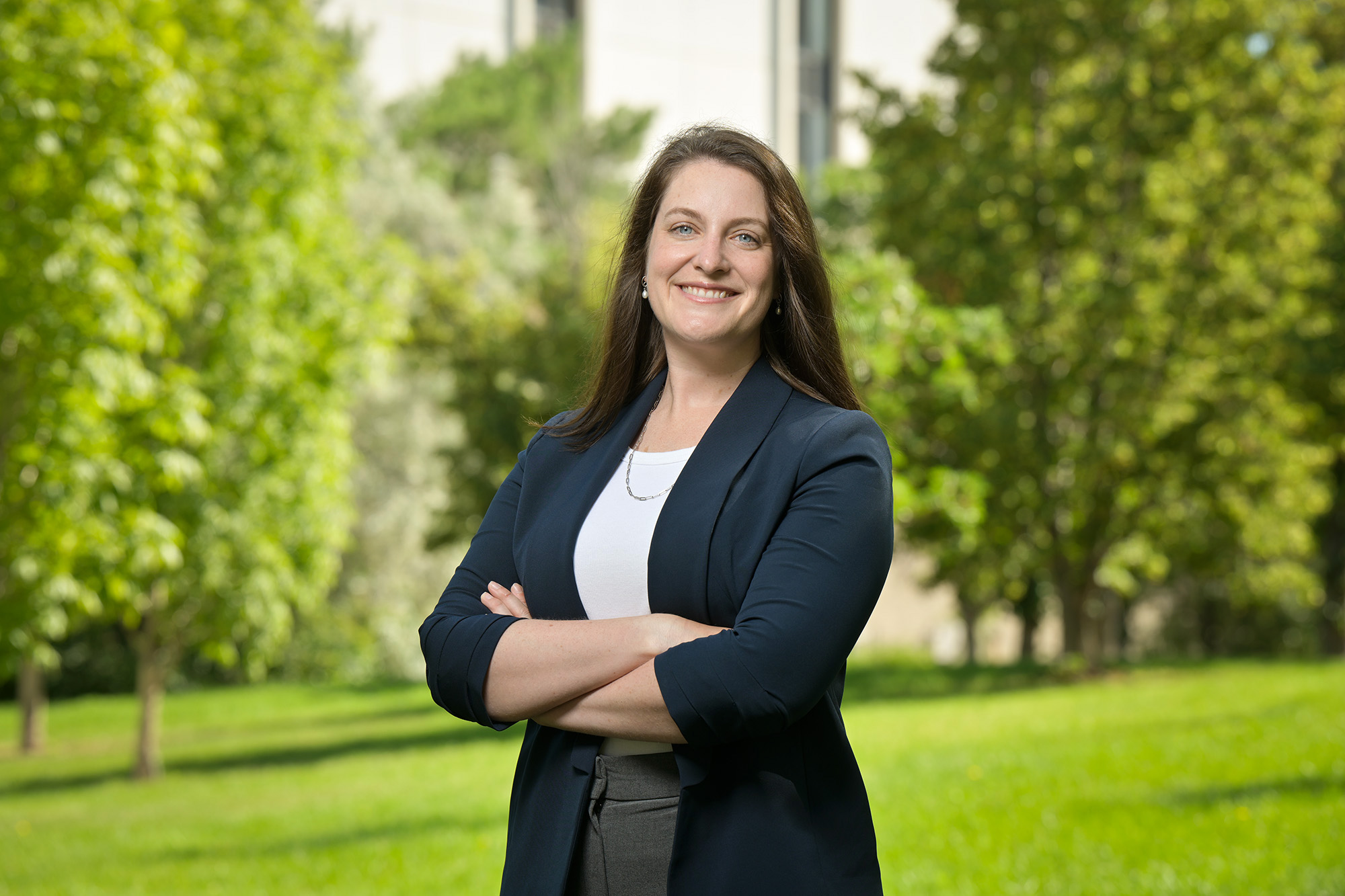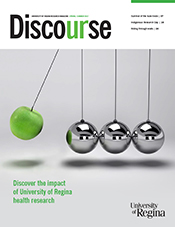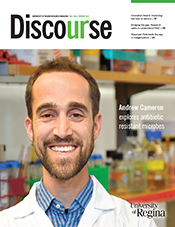Research projects led by 66 University scholars reflect the incredible diversity of research taking place across campus.

University of Regina researchers have secured more than $8 million in funding from Canada’s three federal research granting agencies—the Natural Sciences and Engineering Research Council (NSERC), the Social Sciences and Humanities Research Council (SSHRC), and the Canadian Institutes of Health Research (CIHR). This support includes the prestigious Banting Fellowship and Vanier Scholarship.
These projects, led by 66 University researchers, reflect the incredible diversity of research taking place across campus—from the faculties of Engineering and Education to Social Work and Media, Art, and Performance. Examples include:
- Delving into Indigenous community-led water governance (Dr. Margot Hurlbert)
- Exploring how to give electric vehicle batteries a second life (Dr. Zhanle Wang)
- Examining the impact of toxic positivity in the workplace (Dr. Alexandra Lefcoe)
- Studying rare atoms to understand how the building blocks of matter behave and how the elements in our universe were formed (Dr. Gwen Grinyer)
Investigating the future of digital agriculture
Dr. Emily Duncan, a U of R postdoctoral researcher, received a prestigious SSHRC Banting Postdoctoral Fellowship worth $140,000 to investigate how digital technologies are reshaping Canadian agriculture—and what that means for farmers, rural communities, and the environment.

Her research examines the growing use of tools like artificial intelligence, automation, and algorithm-based decision-making in agriculture. While these technologies are often promoted as solutions to reduce greenhouse gas emissions and boost productivity, much less is known about how they affect the people and places at the core of our food systems.
“There’s a lot of talk about digital technologies being the key to sustainable agriculture,” says Duncan. “But we also need to understand how these technologies affect farmers, food production, land use, and equity in the sector.”
Her work focuses on one of the fastest-growing trends in this space: the development of carbon markets in agriculture. These markets aim to reward farmers for practices that capture carbon in soils—like no-till farming—which could position Canadian agriculture as part of the solution to climate change. But important questions remain: How will these markets be structured? How will digital tools measure and verify carbon capture? And how do farmers view their role in these emerging systems?
Duncan also plans to explore how digital agriculture and carbon markets intersect with broader issues such as corporate consolidation, farmland ownership, and climate policy.
Her Banting Fellowship will advance critical research to better understand both the opportunities and the risks of digital agricultural technologies—and help build more equitable, sustainable food systems in Canada.
Supporting mental health for people with cystic fibrosis
Another project funded through this round of awards focuses on improving the mental health of people with cystic fibrosis (CF), a life-limiting genetic disease that affects about 4,300 Canadians. People with CF often face not only physical health challenges but also increased risks of anxiety and depression. These mental health struggles can make it harder to follow treatment plans, reduce quality of life, and lead to more frequent hospitalizations.
Anna Dollimount, a U of R PhD student in the Department of Psychology, received a $150,000 Vanier Canada Graduate Scholarship to test a new approach to mental health support for people with CF.
“Previous research has shown that one-on-one cognitive behavioural therapy (CBT) can help people with CF manage anxiety and depression,” says Dollimount. “Now I want to find out if virtual group sessions can be just as effective—while also being more accessible, affordable, and safer for participants who are at higher risk from infections in in-person settings.”
The study will assess how the group therapy impacts participants' mental health, stress levels, coping strategies, and overall quality of life. It will also explore participants’ satisfaction with the program, their willingness to stick with it, and their personal experiences.

If successful, the project could offer CF clinics a new, scalable tool to support the mental well-being of adults with CF, potentially improving both emotional and physical health.
Federal funding fuels discovery
Dr. Chris Yost, Vice-President (Research) at the University of Regina, says federal funding is essential for research like this to thrive.
“Our researchers are asking urgent questions, driving innovation, and pushing the boundaries of knowledge to create positive impacts in society,” says Yost. “This support ensures that their work can have real and lasting impact in Saskatchewan, across Canada, and beyond.”
Below is a list of the other University of Regina researchers who received funding as part of the Government of Canada’s bundled announcement:
Canada Graduate Scholarships: Doctoral
Peri Moulding (CIHR): Disrupting bacterial polyamine detoxification to combat virulence and antibiotic resistance, $120,000
Jessica Ollinik (NSERC): Development of a new in-hive passive sampler for monitoring insecticide and fungicide contamination in honey bee colonies, $120,000
Johnna Parenteau (NSERC): “On the distribution of the distinct eigenvalues of a graph, $120,000
Kelsey Haczkewicz (SSHRC): Coping with moral distress: predictors and outcomes among Canadian long-term care staff, $120,000
Denise Kennedy (SSHRC): A study of reclaiming domains to revitalize Anihsinapemowin, $120,000
Laura Kinsman (SSHRC): Understanding spanking beliefs and intentions: A mixed methods study, $120,000
Keetyn Maxwell (SSHRC): Exploring family sport culture: The role of youth sport and leisure in Canadian contemporary families, $80,000
Elise Melanson (SSHRC): Chat, is this real? The intersection of the manosphere and strength training, $120,000
Christie Newton (SSHRC): Understanding political information avoidance in the digital age, $40,000
Tammy Ratt (SSHRC) Within the space of a birch tree: Arts-based approaches to inter-generational Indigenous language, $40,000
Canada Graduate Scholarships: Master’s
Carissa Melnyk (CIHR): Examining the effects of social support and psychological flexibility on mental health in people with central sensitivity syndromes: A mixed methods study, $27,000
Kathryn Most (CIHR): Comparative and functional pathogenomics of Pantoea septica, an emerging opportunistic pathogen of humans, $27,000
Mohammed Quraishi (CIHR) Master’s: Characterization of the identity, distribution, and role of Pantoea-encoded virulence factors, $27,000
Gracie Farago (NSERC): Exploring mechanisms of desiccation tolerance in rhizobium, $27,000
Emily Lightheart (NSERC): Investigating the regulation of gene transfer based on environmental and population signals in E. coli, $27,000
Sydney Plante (NSERC): Beta-delayed charged-particle emission from magnesium-20, $27,000
Zoe Hoyda (NSERC): Computational and experimental spectroscopic and thermodynamic Examination of Zirconium Metal as a Redox Buffer Agent in Molten Fluoride Salts, $27,000
Natalia McCullough (NSERC): Does Executive Function Predict Eye Control?, $27,000
Briana DeRoo (SSHRC): Telephone-based wellbeing program for informal caregivers of long-term care residents: A pilot study, $27,000
Venezya Thorsteinson (SSHRC): A case control study of the influence of migraine with and without premenstrual exacerbation on anxiety and depression, $27,000
Katherine Engel (SSHRC): Unveiling Bias: How victim age and education influence juror perceptions of cybersex crimes, $27,000
Autumn Brambell (SSHRC): Unveiling Bias: How victim age and education influence juror perceptions of cybersex crimes, $27,000
Vanit Shah (SSHRC): School climate factors influencing remote mental health help-seeking among adolescents, $27,000
Taryn Whal (SSHRC): Beyond regret: Future family visions among trans and gender-diverse youth and their caregivers, $27,000
Manahil Fatima (SSHRC): The role of callous unemotional traits and empathy on childhood deception, $27,000
Timothy Yu (SSHRC): Examining the moderating effects of existential wellbeing (EWB) in palliative care: The development and validation of a new EWB scale, $27,000
Raelynne Minel (SSHRC): Explaining intentional behaviour: Perspective taking and political ideology, $27,000
NSERC Discovery Grants
Vanessa da Silva Figueiredo: Developing human-centred methods to optimize machine learning fine-tuning for personalized instruction in K-12 education, $192,500
Liming Dai: Advancing accuracy and reliability of semi-analytical and numerical solutions for complex nonlinear dynamic systems made of functionally graded materials, $215,000
East, Allan: Improving the understanding of ion structure and mobility in modern electrolytic materials, $180,000
Joseph Eremondi: Improving usability of dependently typed programming languages, $222,500
Shaun Fallat: Connections and applications between matrix theory and discrete mathematics, $170,000
Douglas Farenick: Advances in the theory of operator algebras and operator systems, $185,000
Remus Floricel: Product and subproduct systems, $170,000
Gordon Huang: Real-time assimilated optimization-driven equilibrium analysis for net-zero emission transition in Canada's distributive energy and environmental systems, $215,000
Karen Meagher: Algebraic graph theory and Erdos-Ko-Rado theorems, $166,000
Mehran Mehrandezh: Perception-aware motion planning of autonomous systems using event-based imaging, $190,000
Affan Shoukat: Hybrid Computational Methods Integrating Mechanistic Models and Machine Learning with Applications in Epidemiology, $167,500
Christopher Somers: Resource use and subdivision in animal populations, $195,000
Dae-Yeon Suh: Discovery, mechanism and evolution of enzymes in the biosynthesis of sporopollenin and sporopollenin-like materials in streptophytes, $195,000
Maria Velez Caicedo, Tropical freshwater ecosystems through the Quaternary as reconstructed on the basis of diatom and sedimentary records, $180,000
Daoyong Yang: Integrated Performance Evaluation and Optimization of Horizontal/Multilateral Wells Conditioned to Matrix and Fracture Dynamics in a Subsurface Reservoir under Uncertainty, $215,000
NSERC Discovery Grants: Subatomic Physics
Gwen Grinyer: Precision spectroscopy of exotic nuclei, $570,000
Zisis Papandreou: Hadron Spectroscopy and Rare Eta Decays at GlueX/JE, $489,000
NSERC Discovery Development Grants
Shahid Azam: Clay-atmosphere-environment interactions for sustainable geomaterials, $44,000
SD Jacob Muthu: Characterization and optimization of polymer layered nanocomposite liners for mitigating hydrogen embrittlement in transporting hydrogen blend using experimental and physics-driven machine learning techniques, $44,000
Fanhua Zeng: Advanced fundamental studies of multiphase fluid flow and geomechanics in CO2 geological storage processeses, $44,000
NSERC Research Tools and Instruments
Zhanle Wang: Battery cycler system for second-life electric vehicle battery testing and modelling, $150,000
SSHRC Insight Grants
Raymond Blake: Revolutionary in the Palace: A Political Biography of Joseph R. Smallwood, $137,138
Janine Brown: Understanding the Impact of the Social-Political Contexts in Shaping Older Adult Canadians End-of-Life Planning, $358,300
Shela Hirani: Role of Public Libraries in Supporting Integration of Refugee and Immigrant Families Migrating to Canada: A Critical Ethnography, $170,210
Margot Hurlbert: The māmawāyāwin nîkānîmakan nipîy sohkastwāwin ekwa tipeyicikîwin (Indigenous community-led water governance), $369,667
Nathalie Reid: Shifting the focus: Understanding the downstream impacts of educator wellbeing on students' attendance, engagement, and wellbeing, $320,046
SSHRC Insight Development Grants
Ahlam Bavi: Bridging Communities and Cultural Heritage: Ethical Decolonial Preservation Practices at the Winnipeg Art Gallery-Qaumajuq, $74,129
Kaila Bruer: Enhancing adolescent eyewitness reliability: Developing evidence-based confidence assessment protocols for police lineups, $69,828
Shasanka Chalise: DEI disclosures and employee outcomes: Role of source, content, and context of disclosures, $71,814
Magda Cismaru: Transforming higher education with artificial intelligence: How can universities optimize the shift? $70,318
Yu (Hade) Han: Enhancing career adaptability and resilience: An evidence-based competency training program for international students in Canada, $61,195
Alexandra Lefcoe: When positivity becomes toxic: A study of the proximal and distal outcomes of toxic positivity in the workplace, $71,189
Akram Mahani: Youth engagement and well-being: Exploring the role of public art co-creation in marginalized urban communities, $74,982
Heather Nelson: Exploring the impact of intergenerational collaboration on ageism through the co-creation of short films, $64,794
Kathleen Nolan: From resilience to flourishing: Improving the mathematical experiences of minoritized students in STEM subjects, $63,088
Arjun Tremblay: Democratic decline and multinational federalism: What can diversity-oriented federal models tell us about the permutations, causes, and checks against the end of democracy? $68,987
Kedi Zhao: Older East and Southeast Asian adults’ perceptions and coping strategies of anti-Asian racism in the post-pandemic era: A mix-methods exploration, $74,346.00

















